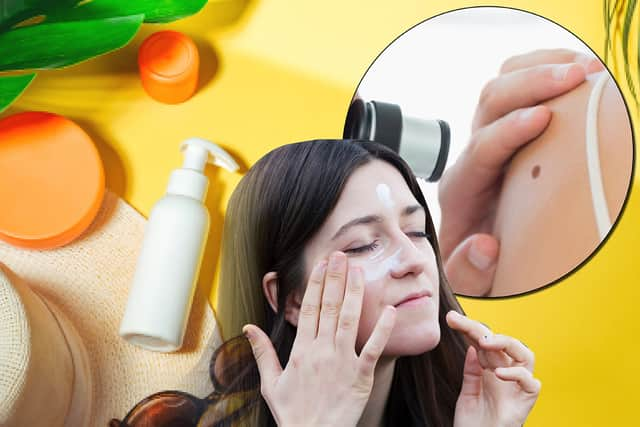Skin cancer: dermatologists issue warning over SPF moisturisers as cancer cases hit new high
and live on Freeview channel 276
The increasingly popular products do not offer the same level of protection as the equivalent SPF sunscreen, the British Association of Dermatologists (BAD) has said.
The warning comes amid an alarming rise in skin cancer - diagnoses have rocketed by 26% in just six years across England, new NHS figures show.
Advertisement
Hide AdAdvertisement
Hide AdMatthew Gass, of the BAD, said skin cancer cases have been on the rise since the 1970s, with it now being the most common cancer in the UK.


He said it is “not necessarily a surprise to see that the most recent skin cancer figures for England show that rates have risen again”.
However, while Mr Gass said it’s not possible to give a definitive reason for the “significant increase” in cases since 2013, it is “likely caused by an ageing population and better cancer registration practices”.
“It is also possible that changes to sun-seeking behaviour are a factor,” he added.
Advertisement
Hide AdAdvertisement
Hide AdMr Gass said in recent years there has been a big increase in the number of moisturisers and cosmetic products containing SPF (sun protection factor).
He said while these are tested in the same way as sunscreens, in reality they “tend to be applied much more thinly, and as such they don’t offer the same level of protection as the equivalent sunscreen”.
He said: “You should only rely on these when you’re getting brief, incidental sun exposure, for example if you are popping out to the shops.”
What types of skin cancer are on the rise?
All types of skin cancer are on the rise in England, according to the latest figures.
Advertisement
Hide AdAdvertisement
Hide AdKeratinocyte cancer, also referred to as non-melanoma, is the most common form of skin cancer.
In 2013, 163,078 cases of this type of cancer were diagnosed in England, which rose to 206,911 in 2019 - a 27% increase.
Melanoma is a type of skin cancer that can spread to other organs in the body. Across England, 12,885 cases were diagnosed in 2013 and 15,332 in 2019 - a 19% rise.
There were also 1,849 diagnoses of rare skin cancers in 2019, which was an 8% increase from 1,658 cases in 2013.
Advertisement
Hide AdAdvertisement
Hide AdIn Wales, diagnoses of melanoma skin cancer have risen by 21% in the six years to 2018. Figures are not published for non-melanoma skin cancer.
In Scotland, the rise in cases has been less pronounced. Diagnoses of melanoma skin cancer have risen by 2% in the six years to 2017, while diagnoses of non-melanoma skin cancer have risen by 4% in the same timeframe.
In total, more than 12,000 new cases of skin cancer were diagnosed in Scotland in 2017 alone.
Skin cancer is the most common form of cancer in Northern Ireland. The number of melanomas diagnosed rose by 8% in the six years to 2019, while the number of non-melanoma skin cancer diagnoses rose by 16%.
Advertisement
Hide AdAdvertisement
Hide AdThe way skin cancer cases are counted can vary, so direct comparison between different areas is difficult.
How can I protect myself from the sun?
The most common cause of skin cancer is exposure to ultraviolet light from the sun or sunbeds, but “taking sensible precautions to protect your skin from the sun is likely to reduce your risk of developing a skin cancer in the future,” Mr Gass said.
He noted that the three main ways to better protect yourself from the sun are shade, clothing and sunscreen.
Mr Gass said that the BAD advises making good use of shade, particularly between 11am and 3pm when it’s most sunny, and wearing protective clothing, including hats and sunglasses in order to protect your skin from the sun.
“As a last line of defence, wear sunscreen with a minimum SPF of 30 and UVA protection,” he added.
Comment Guidelines
National World encourages reader discussion on our stories. User feedback, insights and back-and-forth exchanges add a rich layer of context to reporting. Please review our Community Guidelines before commenting.